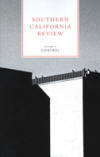Southern California Review – 2013
All the bad, bad boys. You sort of wanted them to fraternize with each other—take the sociopath Greg from Erika Wurth’s short story “Freight Train” and introduce him to the Matthew/Luke character (trust me, they are merged in the story too) from Graeme Mullen’s memoir of creating a community art project, then place them under the suicidal tutelage of Ilya Leybovich’s eponymous ‘suicide artist’ flailing for good fortune in the Upper East Side. I wanted the characters to meet each other, and that is how you know that even the surreal ones are thoroughly alive.
All the bad, bad boys. You sort of wanted them to fraternize with each other—take the sociopath Greg from Erika Wurth’s short story “Freight Train” and introduce him to the Matthew/Luke character (trust me, they are merged in the story too) from Graeme Mullen’s memoir of creating a community art project, then place them under the suicidal tutelage of Ilya Leybovich’s eponymous ‘suicide artist’ flailing for good fortune in the Upper East Side. I wanted the characters to meet each other, and that is how you know that even the surreal ones are thoroughly alive.
This issue of Southern California Review orbits among the stars of “control,” but the editorial touch is effervescent, so you might enjoy the stories without tasting the saffron lines that bind them. It is a decadent montage of genres and tones. Take Sven Birkerts’s memoir about a dog that transcends the literal with intellectual ferocity and gentle humor. Add that to the considerable experimental exploits in each genre—I liked Trinie Dalton’s prose poem “hairpin.” At the other end of the spiritual-experiential scale, we respond to the potential for destruction in Brenda Miller’s teenage pinto death trap (memoir) and the extraordinary suffering and extraordinary courage in Emily Rapp’s “Signature/Mother.” Rapp’s story made me cry all weekend when I heard her interview about it on NPR. Her narrative of caring for a child with Tay-Sachs illness, which is in part included in this volume, is moving and lovely beyond my comprehension.
Jesse Hassenger’s “Fists Full of Feathers” explores, with hilarity, the fiction of searching for a husband for the sake of expeditious divorce. The pacing is pitch-perfect—the backstory controlled, the persistent odyssey motivating tension—and the surprises are likewise somehow perfect, in the lopsided, magical levity that you can only score with laughter.
The placement of certain stories and poems help to regulate the mood of the reading experience. Editors can modulate a circus or a mausoleum with just the right organization, and I think that this journal was magically orchestrated. Under the review of Matt Ackels and Susannah Luthi, we see considerable balance. Some of the writing is so dark and so terrifying that we need the cool intelligence of Leybovich to dull the violence of Diana Wagman’s torturing soldier, whose only connection to her humanity is a memory of babysitting. Or take the placement of Ace Boggess’s “Letter to the Parole Board” that opens the volume. This poem is a great way to begin a volume of balance built to scale. You can hear the longing in some lines (“I’ve not tasted that soft perfume along a neck / in centuries beyond my reckoning”) but the control of feeling, the economy of order, will manage you.
Ryan Ridge’s “Small Green Plastic Army Men will Win the War” seeks to answer Padgett Powell’s Interrogative Mood, in three voices. About three years ago, The New Yorker ran a story by Jonathan Safran Foer where the sentences run fluid—complete disintegration of form with language and idea driven explosions. In Foer’s piece, you have the energy and chaos that Ridge achieves in this piece, but I think Ridge’s work forces a control of that device with a snapshot of editorial guidance.
While the theme of the issue is control, I think it is also worth noting that the volume is generally cinematic. “My Beautiful Goddamn City,” a play by Jon Robin Baitz, is a very apt inclusion not only because of its outstanding literary achievement, but because as readers of this volume we are used to being told a story, whether that telling be philosophical modeling or literary evolution—or maybe just to scare the hell out of innocent readers who are not ready for the whiplash. (I am nodding to Wurth’s story that did a great job of transcending the teenage male angst with a compelling placement of ethnicity in the midst of a hate crime.)
An especially nice aspect of this publication is Matt Ackels’s interview with Diana Wagman. It complements her complex story “Yellow” and provides such smart, sharp commentary about writing and her body of work that it left me ready to sprint to the bookstore to pick up a copy of her next book. And because it serves as an editorial fulcrum with half the journal left to read (if you are reading linearly), it means you are seated – glued to the text but eager to obtain her novel The Care and Feeding of Exotic Pets, and feeling a little out of control, I guess.
[dornsife.usc.edu/mpw/literary-journal]





